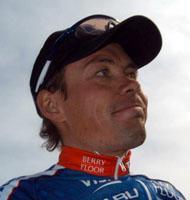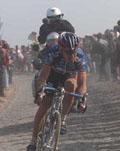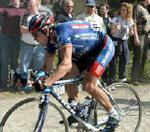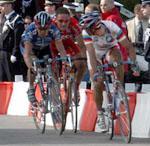
Recently on Cyclingnews.com |
An interview with Viatcheslav Ekimov
A race that makes him feel younger: the 101st Paris-Roubaix
By Sergey Kurdukov, Russian Eurosport commentator
 |
For Viatcheslav Ekimov, arguably Russia's most seasoned classic specialist, a podium in this mythical race had always been much more than just a goal. For the multiple Olympic and World champion, it had been a craving, a dream of a lifetime. Slava came disenchantingly close in 1995 as photo finish film gave the 3rd position to Johan Museeuw.
But Ekimov finally did it in his 5th attempt. A third that is more precious than some wins. So, before the grey dust on the cobbles has time to settle, we ask Eki to relive the greatest moments of this epic contest and share some background facts. He answered the following questions in Andorra where he was expertly bringing his body and soul together after a grueling test that tested both to the limit.
Viatcheslav Ekimov: It is a great place to actively recuperate. After Paris-Roubaix you can hardly be back to normal in a few days' time by means of ordinary massage. This time, it seemed my muscles stuffed with lactic acid like never before. So it took all-round physiotherapy and healthy mountain air to make myself fit for the next weekend when we take on the Amstel Gold Race.
Cyclingnews: Did you do something on your bike during this recuperation period?
VE: Certainly, but it was limited to 2-3 hours of leg-spinning in the saddle without any specific work.
CN: Then let us keep to the actual order of the events. What did your training consist of in the week preceding Paris-Roubaix? Anything special?
VE: Nothing special at all.
CN: No reconnaissance, which is so fashionable and thought to be an integral part of preparation or even something sacral to Classic riders?
VE: No, although there were a couple of cobbled sections I wouldn't have minded to see, but the effort I had to make wasn't worthwhile. Of course every man to his taste, but for me personally it's much better to focus on accumulating energy rather then working out on these ancient boulders.
I tried the alternative method too a couple of years ago, and the only thing it resulted in were perineal problems that aggravated torture in the race. That's what they call experience, you have to find your unique way of peaking for the Roubaix.
I for one make use of the amount of training I do in wintertime and early spring, and during the last week I even avoid climbing any sort of hills, let alone riding along cobblestones. I also had ridden the whole of the race in my mind's eye on the eve of the start; it was also of great help.
 |
CN: Well, than what about your bike? A lot of teams mechanics carry out some more or less serious tuning aimed at this race.
VE: Again my answer will disappoint you. It was an ordinary Trek we ride in other races, the only difference was that the forks were changed back from straight ones we normally make use of this season to curved ones. Theoretically it helps to smoothen vibration. Also we made use of Hutchinson tyres. We ride 20 and 22 in most of races but here we were given 25mm wide ones. For some guys, the pressure was 6 kilos, but I preferred them stiffer. Weak pressure creates a measure of comfort on cobbles but as soon as you find yourself on asphalt, you feel as though you've got a puncture.
CN: Any changes to the small chainring?
VE: 44, and the bigger one was 53, like in any other flat race. The 9 speed Shimano cassette was 11 to 21.
CN: How about double handlebar tape?
VE: I've never used them - the handlebar feels abnormally fat. But it [not using another layer of tape] is more dangerous, as there is a risk of injuring your finger joints on the shaky parts of the road. There are no minor factors in a race like that [Roubaix], every small thing can turn out all-important.
CN: As far as I know, you give much attention to your riding technique on the cobbles. Could you share some secrets with us?
VE: Strange as it is, you should keep relaxed. I move myself back along the saddle plate as far as possible and never lock my fingers on the handlebars too much. Hands get tired first, muscles start to cramp, nerves begin to ache - and you are no longer a contender after that. And never hold onto brake levers. You can do it anywhere else but not on the cobbles, as you're very likely to destroy ligaments in your arms.
CN: Had there been any signs for you that this race would be the most successful ever for you?
VE: Yes, firstly it was a top 10 in the Tour of Flanders, and secondly it was a wonderful weather forecast. A rainy Roubaix is not for me, like in 2000 when I called it quits before the second feed zone. You mean to ride in one direction; your bike carries you into the other. But it doesn't imply that a sunny race is easy. There is no such thing in the world as an easy Paris-Roubaix.
CN: Do you think wind was a major factor in that Sunday's conditions?
VE: Only the first hundred kilometres, when we sped along the highway in pursuit of the front group. On cobbled sections you've got other troubles to pay too much attention to wind.
 |
CN: Who had the leader's status - you or Max Van Heeswijk?
VE: Both of us did. We were on equal terms, half of the team was at my disposal, the other half at his. When both of us made it to the leading group, it was great. But if Max hadn't fallen, I would have worked for him in the final part, ahead of my personal ambitions. He's a better sprinter. You should always think of the team's success first.
CN: But some of your fans ask if it's not demoralizing to work for another when you feel capable of something yourself.
VE: If you ask my personal opinion, I opt for riding with a team that has a clear leader, where every rider has his definite role to play. And I absolutely don't see anything wrong in riding for the leader. Such sort of organization is highly effective and truly professional. I hope Lance's string of success in the Tour is a brilliant illustration of that.
CN: Did you get your portion of bad luck in this year's race? Did you puncture?
VE: You can't do without a puncture in Paris-Roubix. I flatted twice. And in retrospect, I was in luck both times. First time it happened in Arenberg, but our mechanic with a spare wheel stood by the road, so practically I didn't lose any time. The other puncture was harder to deal with. Victor Hugo Pena was at my hand and gave me his wheel, but the group had already split to pieces by that moment, so I gave it my all the next dozen kilometers to return to the leading pack. It was a real problem to find out if the group you chased down was the right one. I looked at the backs - no Museeuw, no Van Petegem - wrong people, chase on, the big ones are still somewhere in front.
CN: Was that a critical moment for you in this race? Did you tell yourself your chances are gone?
VE: Not quite. I was more or less in control this time. That was a critical part of the race, but it was critical, I believe, for everyone who was still riding in the last 30 km or so. You should bear in mind the sheer amount of tiredness and throw in last cobbled sections which really follow one another. You can't eat or drink on these cobbles , you can't let go your handlebars, so you start to starve on top of it all. Journalists shouldn't wonder why we are sometimes so short of emotions after this sort of a race.
CN: Did an idea of a victory cross your mind during the final 30km-long surge?
VE: When I remained with Pieri, and the Italian started to drop out on some cobbles, yes, a wild thought came through my head that I can try and win it alone. Yet, when Van Petegem rode up to us, I thought: "Here we are, this man you'll never drop".
CN: Still you went on doing most of the work in front. You tried to secure your podium position? Better a bird in the hand than two in the bush, was that the case?
VE: Exactly. I knew that in the chasing group there were guys who had always been better sprinters. If they closed those 30 seconds of the gap, my number would be up, I was most likely to lose the battle for third.
CN: And what about your last attempt to come in first in the velodrome?
VE: I didn't give up without a fight. My only serious chance was in a classical track sprint, with false spurts and variations of pace. But this old velodrome with long straights and a flatter banking, it is not devised for this kind of game. I was so tired. And Van Petegem... with his six-days experience, he is not the man to be taken by surprise.
 |
CN: You say this time Dame Fortune was on your side. Generally speaking, what part of a success in Paris-Roubaix is made of pure luck?
VE: It's luck by 75 per cent! You can get stuck with a puncture for ages, and your chances are ruined in the wink of an eye. But if your teammate helps you and your mechanic is in the right place - the rest is up to you.
CN: There is a legend that goes as follows: one of the winners of Paris-Roubaix says right after the finish "Oh how I hate this race!" What about your emotions?
VE: I love this race! I really do. It's hard to put in a couple of phrases why. I feel strong when I ride it like this time. And I feel truly young. When you see how many young, fresh, ambitious men finish behind you, you forget your age.
CN: I know it was a great dream of yours to make the podium of the queen of the Classics. Now the dream has come true. Will there be a next goal? Something like following Duclos-Lassale's tyre marks, so to speak - both in the sense of age and the place on the finish.
VE: My great dream has just materialized. What you're asking about would be another, greater dream... I don't know. What I can say right now is that I'll be happy to take as many starts in this race as my future career still holds in store.
